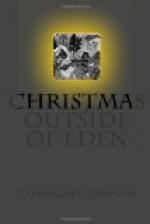“That’s done us all good,” said God. “I must have a baby for my very own exactly like him. I almost think that everybody ought to have babies.” Then catching sight of the dog and the robin, He added, “I mean the animals, too.”
He turned to the Man. “What day is this? I’ve not been counting since I ceased to walk in Eden.”
The Man answered humbly. “Dear God, it is the twenty-fifth of December.”
“I must remember that,” said God thoughtfully. And then to the Virgin, “Come. It grows late. There is no one to light the lamps of Heaven. You shall have your desire; for you, too, are a woman.”
And the robins say that God did remember, for it was on the twenty-fifth of December, centuries later, that his own son was born into the world. They say that the limestone ridge within sight of Eden was the spot where Bethlehem grew up after Eden vanished. They even say that the cave to which Mary came on another winter’s night, when the doors of the inn had been closed against her, was the very same. There, where the world’s first baby had been born, she wrapped God’s son in swaddling clothes and laid him in a manger, for the cave had now become a stable. Perhaps the heavenly host who sang “Peace and Goodwill” to the shepherds was the same, though the robins do not assert that.
Of one thing they are certain: that every time a baby is born God laughs again and His laughter travels down the ages. And that is why on Christmas Day everyone is especially kind to children, because it was a little child who gave the first laugh and taught grown people, even God Himself, how easy it is to love when one is merry.
THE END
CHRISTMAS OUTSIDE OF EDEN
By
CONINGSBY DAWSON
Author of “The Little House,”
“The Seventh Christmas,”
“Carry On,” etc.
WITH ILLUSTRATIONS BY
EUGENE FRANCIS SAVAGE
A delightful Christmas fantasy told with inimitable charm and delicate humor. It is “the story the robins tell as they huddle beneath the holly on the Eve of Christmas”—the sensation created by the birth of the first baby, among the animals on earth, the angels in heaven, and even in the mind of the surprised Almighty Himself. The conception of the Deity is a primitive one, as required by the nature of the tale, and the story should be read as a “myth-story.”
DODD, MEAD & COMPANY
Publishers new York



